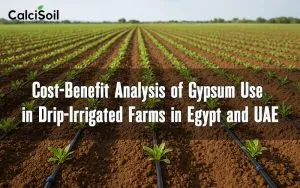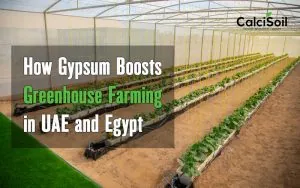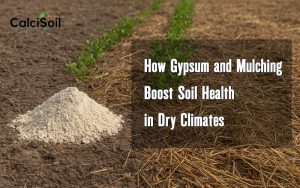
Gypsum as an agricultural amendment
Gypsum is a soil agricultural amendment that has been used in agriculture for centuries. It’s a moderately soluble source of calcium and sulfur, which are essential plant nutrients, and can improve overall plant growth.
Using agricultural gypsum reasons
Gypsum for agriculture is a versatile soil agricultural amendment that offers many benefits to farmers. Here are some reasons for using agricultural gypsum.
Improves soil structure. Gypsum for agriculture can improve soil structure by breaking up compacted particles through a process called flocculation. This leads to better water infiltration rates, improved hydraulic conductivity of soil, and better water storage in the soil. all of which lead to deeper rooting and better water-use efficiency.
Reduces soil acidity. Gypsum can reduce soil acidity, particularly in subsoils, by treating aluminum toxicity. It can improve some acid soils even beyond what lime can do for them.
Adds nutrients to the soil. Gypsum is a source of calcium and sulfur for plant nutrition. It can also add sulfate sulfur and calcium to the soil. which can boost fertility and improve seedling emergence and plant health.
Reduces runoff and erosion. Gypsum can reduce runoff and erosion by increasing the ability of soil to soak up water after precipitation. It can also cut down on phosphorus movement from soils to lakes and streams.
Remediates sodic or saline soils. Gypsum for agriculture can help remediate and revitalize sodic or saline soils. It’s used to keep peanuts disease-free and prevent blossom-end rot of watermelon and tomatoes, as well as apples bitter pit.
Gypsum can be applied at any time of the year. but it is most effective when applied before planting or during the fallow period. It can be applied by broadcasting it over the soil surface or by incorporating it into the soil.
Overall, agricultural gypsum is a proven resource that can improve soil structure, add nutrients to the soil. and reduce runoff and erosion. It is also useful in changing the soil structure of heavy soils and remediating sodic or saline soils.
Best gypsum for farming
There are several types of gypsum for farming available. but the best type of gypsum for farming depends on the specific needs of the soil. Here are some options.
Agricultural gypsum powder. Everbright Corporation offers agricultural gypsum for sale that can be used as soil conditioners and fertilizers. These powders can improve soil structure and supply calcium and plant-available sulfate sulfur to the soil.
Bulk gypsum. This type of gypsum is effective in improving soil treatment in crops. and can be used to remediate sodic or saline soils.
High-grade gypsum. High-grade gypsum is a pure form of gypsum that is mined from geologic deposits. This type of gypsum is a good source of calcium and sulfur for plant nutrition and can improve soil structure.
Agricultural gypsum vs. lime. agricultural gypsum is a better option than lime for improving soil structure and adding nutrients to the soil. Gypsum contains two important elements for crop growth, calcium, and sulfur, and can improve soil structure.
Economics of agricultural gypsum use
The economics of agricultural gypsum use can be favorable for farmers, with potential benefits that outweigh the costs. Here are some key points regarding the economics of agricultural gypsum use.
Historical significance. In the late 1700s, Benjamin Franklin observed French farmers’ use of gypsum on crops. and was impressed enough to import the product for use on his own farm. This early recognition of the benefits of gypsum highlights its long-standing economic value in agriculture.
Potential benefits. Gypsum use on cropland offers a range of potential benefits. including improved soil structure, increased nutrient availability, and enhanced water infiltration rates. These benefits can lead to higher crop yields, better water-use efficiency, and improved overall soil health.
Farmers’ experiences. Surveys of farmers have shown most farmers who applied gypsum as soil amendment found that returns substantially exceeded the costs. The mean partial benefit-to-cost (B/C) ratio was estimated to be 1.68, indicating a positive economic impact of gypsum use.
Profitability. Many farmers reported that their gypsum use was profitable, further supporting the economic viability of this soil amendment. The specific benefits from gypsum usage can vary depending on the soil type, crop, and management practices. but overall, the potential for positive economic returns is significant.







